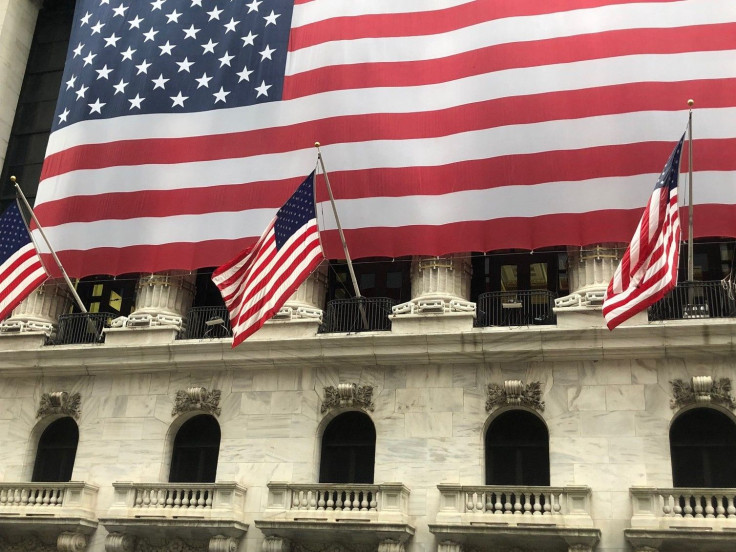Tuesday’s Stock Market Open: US Equities Rise While Consumer Prices Weakened In April

KEY POINTS
- U.S. consumer price index dropped 0.8% in April, while core CPI fell 0.4%
- Wuhan, China, reported its first new coronavirus infections since the city ended its lockdown
- The NFIB Small Business Optimism Index fell 5.5 points to 90.9 in April
Update: 12:05 p.m. EDT:
U.S. stocks turned narrowly mixed in listless trading at noon on Tuesday.
The Dow Jones Industrial Average gained 10.09 points to 24,232.08, while the S&P 500 slipped 2.76 points to 2,927.56 and the Nasdaq Composite Index rose 19.79 points to 9,212.14.
Minneapolis Federal Reserve President Neel Kashkari warned that the U.S. economy will not recover quickly from the coronavirus crisis.
“The U.S. government is able to issue large amounts of debt cheaply, and should do so to support the economy,” he added.
Philadelphia Federal Reserve Bank President Patrick Harker said the recovery from the pandemic will be uneven. But he warned if the economy reopens too quickly, that could lead to disaster.
"Not only would this be a health catastrophe, but it would reverse the recovery as well," Harker said.
Original story:
U.S. stocks opened higher on Tuesday, although the consumer price index dropped in April.
The Dow Jones Industrial Average gained 120.27 points to 24,342.26, while the S&P 500 rose 10.89 points to 2,941.21 and the Nasdaq Composite Index advanced 36.55 points to 9,228.90.
The U.S. consumer price index dropped 0.8% in April from March -- the biggest monthly decline since December 2008. Annual consumer inflation slowed down to 0.3%, the smallest increase since 2015.
The core consumer price index, which strips out the volatile food and fuel sectors, fell 0.4% in April from the prior month after a 0.1% decrease in March.
Randy Frederick, vice president of trading and derivatives, Schwab Center for Financial Research, tweeted that the core CPI decline was “the largest monthly drop ever recorded. This one goes back to 1957.”
New York Gov. Andrew Cuomo said on Monday that the state will lift restrictions on some low-risk businesses on Friday.
Dr. Anthony Fauci, director of the National Institute of Allergy and Infectious Diseases, will testify before the Senate Health Committee at 10 a.m. EDT to talk about reopening the economy. He is expected to declare that reopening too fast would cause “needless suffering and death.”
Wuhan, China, reported its first new coronavirus infections since the city ended its lockdown last month.
“Markets have been torn between optimism on the tentative reopening of some economies and caution on the still grim economic data,” said Mike Pyle, global chief investment strategist at BlackRock Investment Institute. “Markets will watch out for any cracks in the financial system and elsewhere in the economy as virus infections climb.”
James Athey, investment director at Aberdeen Standard Investments, cautioned: “The increased risk from U.S./China trade relations and the data from countries at the leading edge of the virus spread are a real fly in the ointment for investors hungrily eying a rapid return to economic normality to justify their long risk exposure.”
The National Federation of Independent Business Small Business Optimism Index fell 5.5 points to 90.9 in April. The drop was not as bad as expected.
“The full force of the recession has not yet been felt as programs such as [Paycheck Protection Program] encourage firms to maintain employment even as the government shutdown reduces business activity,” said NFIB chief economist William Dunkelberg. “A large percentage of the unemployed expect to be rehired as the economy opens back up, but the picture is further confused by unemployment benefits that for many exceed previous pay. Small business owners are starting to rehire laid-off employees as states lift business restrictions and small business loans are hitting bank accounts.”
The Federal Reserve will begin its Secondary Market Corporate Credit Facility by purchasing exchange-traded funds which track part of the debt market.
Overnight in Asia, markets closed lower. The Shanghai Composite edged down 0.11%; Hong Kong’s Hang Seng fell 1.45%; while Japan’s Nikkei-225 slipped 0.12%.
In Europe markets traded mixed, as Britain’s FTSE-100 gained 1.04%, while France’s CAC-40 fell 0.44% and Germany’s DAX edged up 0.16%.
Crude oil futures jumped 6.3% at $25.66 per barrel, Brent crude rose 2.8% at $30.46. Gold futures rose 0.49%.
The euro edged up 0.59% at $1.0873 while the pound sterling inched up 0.07% at $1.2343.
© Copyright IBTimes 2025. All rights reserved.





















